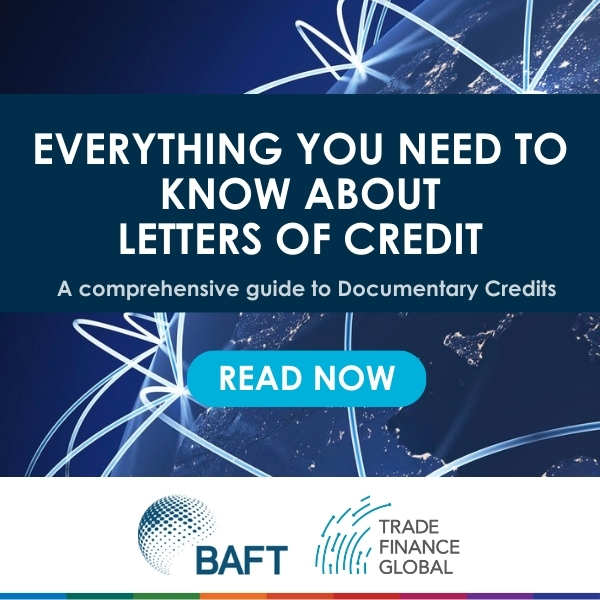Financial Crime, Fraud and Sanctions
Financial crime
By making available to their clients an array of trade finance products designed to facilitate international trade, banks have become accustomed to the need for practical tools and processes that manage and mitigate operational and documentary risk. Fraud and, to varying degrees, sanction regulations have also required close monitoring with the inherent creation of specific practices, processes, and technological aids.
Recently, financial crime has taken centre stage to the extent of an increased and collaborative focus on combating the issue. It can significantly negatively impact individuals, companies, and the economy of countries. Fraud is, and always will be, a potential risk in trade finance transactions. However, while it is crucial to identify fraudulent transactions, they impact only a tiny percentage of global trade finance volumes.
The ICC Financial Crime Risk and Policy Group describes financial crime as laundering money, financing terrorism and providing weapons for prohibited uses, breaking sanctions, financial fraud, financial crimes such as tax evasion, and other predicative offences related to trade products and other financial services.
Many international bodies have been established to combat such crime, with part of their focus on providing tools to help prevent and identify suspect transactions. On an organisational level, there are several things that firms can do to help mitigate their exposure to financial crime and the resulting implications.
All companies should maintain internal guidelines advising staff on the compliance requirements for handling trade finance transactions. A key element should be identifying and handling transactions covering dual-use goods, which are goods that can be used for both civil and military purposes.
Operations departments are not generally required to investigate commercial transactions that fall outside their scope of business or the type of transaction being handled. However, they should be aware of the business of their counterparties and usual trading patterns.
An organisation can occasionally find itself in a situation with potential legal implications and costs and the risk of irreparable damage to its reputation. Reputational risk can often have far more significant consequences than the imposition of any financial penalty.
Fraud
Fraudulent trade transactions have occurred since trading began thousands of years ago. Buyers and sellers must know the potential for fraud and have safeguards built into their processes and procedures. There is a saying that all stakeholders should consider: “If it sounds too good to be true, it usually is.”
Lord Diplock (1907-1985), an English judge, referred to fraud in a documentary credit transaction as: “Documents that contain, expressly or by implication, material representations of fact that to [the issuer’s] knowledge are untrue.”
As with financial crime, companies must adopt processes, procedures and guidelines for identifying, escalating, and reporting fraudulent transactions to minimise potential financial loss. Fortunately, fraud only impacts a tiny fraction of trade finance transactions due to the safeguards and risk mitigants inherent in ICC rules, provided they are used and complied with.
Here are some examples of common fraud-related scenarios:
- A buyer believes that the seller has committed fraud and seeks to prevent a bank from effecting payment by obtaining a court injunction.
- Fraud based on either non-existent or poor-quality goods or falsifying one or more documents within a presentation under a documentary credit, standby credit, or guarantee.
- A bank refuses to pay the beneficiary based on alleged or proven fraud.
- A bank has effected payment, and a refund of the payment is required due to fraud.
- Fraudulently issued bank undertakings such as documentary credits, standby credits, and guarantees.
Sanctions
A sanction is a measure adopted against a country, regime, or individual that officials believe is violating international law. Sanctions are also political trade restrictions to maintain or restore international peace and security.
Sanctions concerning trade finance are financial or trade controls that can be (and are) imposed for political or economic reasons by the United Nations, the Office of Foreign Assets Control (OFAC) in the USA, the European Union (EU) Council, and individual countries.
The main objective of a sanction varies according to the applicable circumstances. For example, an arms embargo and a ban on the export of certain items or raw materials could be aimed at supporting a peace process and restricting the financing of weapons by combatants. Sanctions are also commonly aimed at preventing weapons from falling into the wrong hands.
Several other examples of objectives that sanctions may seek to achieve are:
- A change in the conduct of a particular country, regime, company, or individual.
- Placing pressure on a country, regime, company, or individual to comply with set objectives.
- As a punitive measure when peace and security are threatened.
- Deterring, preventing, and suppressing terrorist financing and terrorist acts.
Failure to comply with sanction regulations can be extremely costly, not only in terms of a monetary fine but also damage the reputation of the concerned parties.
ICC Banking Commission
The ICC Banking Commission issued a guidance paper on using sanctions clauses in documentary credits in 2010, updated in 2014. The paper deals with the use of clauses concerning trade, economic or financial sanctions, or embargoes in trade finance instruments (documentary and standby letters of credit, demand guarantees, and counter-guarantees) that are subject to the rules drafted by the ICC Banking Commission.
The issue of sanctions applying to documentary credit transactions has surfaced several times. As stated in the paper, sanction clauses have become problematic because they lead to uncertainty about their application and could defeat the independent nature of such instruments. The purpose of the ICC’s guidance paper was to highlight this issue and recommend best practices in that respect.
Owing to a resurgence in using sanctions clauses in documentary credits, the ICC addressed this issue again and released an addendum to the guidance paper in May 2020.
The key messages in this addendum are that:
- Sanctions clauses should not be used routinely.
- Any clause should be drafted in clear terms according to the sample clause.
The ICC re-states the recommendation that sanctions clauses should not be used under normal circumstances. However, if one is to be used, then such a clause should be drafted in clear terms, restrictively, to limit the reference only to mandatory law applicable to the bank, according to the following sample clause:
“[notwithstanding anything to the contrary in the applicable ICC Rules or in this undertaking,] we disclaim liability for delay, non-return of documents, non-payment, or other action or inaction compelled by restrictive measures, counter-measures or sanctions laws or regulations mandatorily applicable to us or to [our correspondent banks in] the relevant transaction.”
Download our free Letters of Credit guide by filling in the form below:
Contents
1 | Introduction to the Letter of Credit
2 | Types of Credit
3 | UCP 600 and the Letter of Credit
4 | UCP 600 – Ultimate Guide
5 | Benefits of Letters of Credit
6 | Handling Document Discrepancies
7 | Restricted Letters of Credit
8 | Letters of Credit vs Bank Guarantees
9 | Standby Letters of Credit
10 | Sight Letters of Credit
11 | eUCP Explained
12 | URC 522 and eURC
13 | SWIFT Messaging Types
14 | Research
15 | BAFT & TFG Guide
16 | Parties Involved
17 | Letters of Credit Rules
18 | ISBP 821
19 | Financial Crime, Fraud and Sanctions
20 | Presentation of Documents
21 | Dispute Resolution
22 | Digitalisation and the Future
 Australia
Australia Hong Kong
Hong Kong Japan
Japan Singapore
Singapore United Arab Emirates
United Arab Emirates United States
United States France
France Germany
Germany Ireland
Ireland Netherlands
Netherlands United Kingdom
United Kingdom















